I don’t know how your work week is going but mine – despite some fabulous customers and fabulous co-workers (not to mention the joy of working with my wife each day) – is, well, you know. I won’t report the stuff that has gone wrong, the stuff that has broken my heart, the failures of our supply chain and my own bad attitude. When the Bible says that work is both good and cursed, I get it. Don’t you?
![]() Of course one of the reasons we started our store almost 35 year ago was to help ordinary Christian people learn about and live into a wholistic vision of faith that naturally integrates faith and life, spirituality and society, worship and work.
Of course one of the reasons we started our store almost 35 year ago was to help ordinary Christian people learn about and live into a wholistic vision of faith that naturally integrates faith and life, spirituality and society, worship and work.
Happily there has been a renaissance in the last few years of Christian folks – more within the serious evangelical world than within mainline denominations, it seems – wanting to read about a Christian view of vocation and call, to form study groups around career areas (law, medicine, business, tech, the arts, and the like.) And there are numerous conferences about faith and work. In fact, I’m excited to be a keynote speaker at the Colorado Christian Business Alliance annual gathering in Denver (see here) on September 22, 2017. I’ll be doing something different there, but here’s a little clip of a presentation I did in St. Barthlomew’s Cathedral in New York City when Redeemer Presbyterian’s Center for Faith and Work had me share briefly about my work as a small town bookstore retailer. I spoke right after Richard Mouw so referenced some of his books and I made some dumb quip about Tim Keller’s (good) books while he was in the audience. You might enjoy hearing me talk about our work, blessed and sin-struck as it is, as we all are.
Which all again makes we wonder what prayers will be prayed this up-coming Sunday, or, perhaps at least on Labor Day weekend, honoring those of us who spend most of our days in the work-world. (Or those who are unemployed or underemployed and struggle with this question of making a living, let alone discerning a call to any particular vocation.) The Episcopalian Book of Common Prayer has some prayers for such occasions as do other books of prayers and worship resources that we stock. I wonder how many churches will make any connections to the historic national holiday and our own theology of work?
I know that some congregations make a habit of praying, throughout the year, for their members in their various callings. They pray for teachers, for health care providers, for public servants, blue-collar workers, state employees, artists and students and more.
Of course we pray for our church leaders, for missionaries we know by name, and, as the Bible commands, our elected officials and our enemies. But when we pray for business folk, for farmers or engineers or journalists or factory workers or nurses it sends a big message, truly invoking God’s blessing suggested that ordinary workers need God’s help and power and wisdom because what they do matters to God’s Kingdom as does the work of the minister or missionary. Friends, that’s huge.
If this is somewhat new to you, I’d invite you to read a few of the other essays and book review columns I’ve done on this topic at BookNotes.
See for instance, HERE (a massive list of books about vocation, calling and work), HERE (a recent review of John Van Sloten’s Every Job a Parable which names other books and lists), HERE (where I write about Timothy Keller’s important Every Good Endeavor book and offer a James Taylor song), or HERE (where I share a review of two wonderful books, The Invisibles: Celebrating Unsung Heroes of the Workplace and the beautiful Finding Livilihood by Nancy Nordenson.) You might like my review of the captivating and inspiring Factory Man: How One Furniture Maker Battled Offshoring, Stayed Local – And Helped Save an American Town by Beth Macy which I reviewed HERE. Maybe you’d be kind enough to share some of them with folks in your circles who might appreciate my lists and suggestions. I don’t know, frankly, any other bookstore who does this kind of work, and we’re hoping you find it helpful.
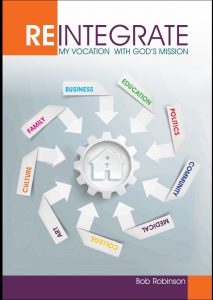 We would like to congratulate our good friend Bob Robinson for his new edition of a book we have had available for a while and have talked about for several months now, but which has been given a new official release this week, Reintegrate Your Vocation with God’s Mission (Good Place Publishing) $14.00. It is truly one of the best little books of its kind, an easy read, a provocative read, a good study with bunches of questions and learning exercises (and a good leaders guide in the back.) As you can see from the above links, there are plenty of books of varying sizes and sophistication about the Christian call to think faithfully about the work-world. But there is nothing like this, a substantive but relatively brief study. There are seven chapters and each has Bible verses to consider, good quotes and excerpts from other writers (set aside nicely in helpful sidebar boxes) and wonderful, practical application type questions.
We would like to congratulate our good friend Bob Robinson for his new edition of a book we have had available for a while and have talked about for several months now, but which has been given a new official release this week, Reintegrate Your Vocation with God’s Mission (Good Place Publishing) $14.00. It is truly one of the best little books of its kind, an easy read, a provocative read, a good study with bunches of questions and learning exercises (and a good leaders guide in the back.) As you can see from the above links, there are plenty of books of varying sizes and sophistication about the Christian call to think faithfully about the work-world. But there is nothing like this, a substantive but relatively brief study. There are seven chapters and each has Bible verses to consider, good quotes and excerpts from other writers (set aside nicely in helpful sidebar boxes) and wonderful, practical application type questions.
Just so you are aware, this book is good even for those that don’t have traditional jobs – retired folks or students or the self-employed, or those called to be the primary homemakers and caretakers of children. I know it has been used in job-site lunchtime studies and it does have a few questions inviting folks to talk about things going on at work, but I am confident that almost anyone would enjoy it. And almost anyone will be surprised to see how we really do need to be more intentional about re-integrating our lives so they all aspects of our lives are more inter-related, more coherent, less fragments and more seamless.
In fact, on the opening pages, Bob writes:
This Bible study has been created to give God’s people the biblical foundation for reintegrating their faith back into every facet of life, especially in that aspect of life in which we invest a huge amount of time and energy: our work. Work is central to our purpose as we participate with the mission of God. As Steven Garber says, “Vocation is integral, not incidental, to the missio Dei – the mission of God in the world.”
After explaining just a bit about God’s original harmony – shalom is the Hebrew word, a word he comes back to in greater, very helpful detail – he notes that “we need to move our lives back into that original integration that God wants for us.”
But, this unique set of studies presumes the vision of an integrated, coherent life. These studies “do not try to help us ‘bring our faith into the workplace’ or ‘created balance in our lives.’ Instead, we will learn how vocation is intrinsic to being human and essential for our participating in God’s mission. We need to reintegrate our lives.”
Besides the shout out to his friend and mentor Steve Garber (and his fabulous book Visions of Vocation) Bob quotes Tom Nelson (and his must-read Work Matters: Connecting Sunday Worship and Monday Work) who writes,
The doctrine of vocation properly understood weaves together in a seamless life of true discipleship in all facets of life. Vocation is the path of daily life where we are called to be a faithful presence in the world.
 I am so very glad for Bob’s keen insight as a facilitator of good conversations, his ability to weave together these kinds of provocative quotes and good questions and Biblical material. He has an MDiv from Trinity Evangelical Divinity School where he studied with top-notch Biblical scholars such as D.A. Carson and Scot McKnight. He’s a good father and dad and church leader and he’s a fine campus minister for the CCO at a small branch campus of Kent State University. He has learned to translate for pretty ordinary folks exceptionally nuanced theological research and sociological insight about the nature of the faith and salvation, discipleship and service, calling and work, formation and holiness, life and times, in a way that few have.
I am so very glad for Bob’s keen insight as a facilitator of good conversations, his ability to weave together these kinds of provocative quotes and good questions and Biblical material. He has an MDiv from Trinity Evangelical Divinity School where he studied with top-notch Biblical scholars such as D.A. Carson and Scot McKnight. He’s a good father and dad and church leader and he’s a fine campus minister for the CCO at a small branch campus of Kent State University. He has learned to translate for pretty ordinary folks exceptionally nuanced theological research and sociological insight about the nature of the faith and salvation, discipleship and service, calling and work, formation and holiness, life and times, in a way that few have.
Sure the aforementioned Tim Keller has one of the pivotal texts in this movement (Every Good Endeavor: Connecting Your Work to God’s Mission, co-authored with our fiend Katherine Leary Alsdorf) and authors like Amy Sherman have challenged us very deeply to think about work and jobs in Kingdom ways (see her extraordinary Kingdom Calling: Vocational Stewardship for the Common Good.) So much of this movement presumes a knowledge of the eloquent truth in Os Guinness’s brilliant The Call: Finding and Fulfilling the Central Purpose of Your Life or the flood of books inspired by it.
The faith and work movement has, in many ways, been inspired by Abraham Kuyper’s worldview-rocking Lectures on Calvinism and Andy Crouch’s Culture Making: Recovering Our Creative Calling and the hefty Oxford University Press study To Change the World by James Davison Hunter, all which grapple with the large, large question of the relationship of Christ and culture, what it means to be “in but not of the world” and how we take up our roles in institutions and marketplaces and the like. Of course, the answer to this that we find most compelling is an “all of life redeemed” transforming worldview spelled out in books like Brian Walsh & 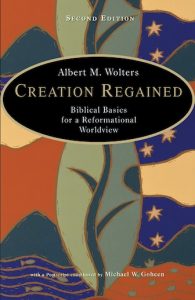 Richard Middleton’s The Transforming Vision and Al Wolter’s Creation Regained: The Biblical Basis for a Reformational Worldview and Michael Witmer’s Heaven Is a Place on Earth: Why Everything We Do Matters to God all the way through to recent books on public theology by James K.A. Smith and the life-changing orientation of N.T. Wright’s Surprised by Hope and his other books on a missional/Kingdom eschatology. Our bookstore has specialized in these sorts of energizing books for the formation of a uniquely Christian world-and-life view and social imagination that allows us to live faithfully in every zone of
Richard Middleton’s The Transforming Vision and Al Wolter’s Creation Regained: The Biblical Basis for a Reformational Worldview and Michael Witmer’s Heaven Is a Place on Earth: Why Everything We Do Matters to God all the way through to recent books on public theology by James K.A. Smith and the life-changing orientation of N.T. Wright’s Surprised by Hope and his other books on a missional/Kingdom eschatology. Our bookstore has specialized in these sorts of energizing books for the formation of a uniquely Christian world-and-life view and social imagination that allows us to live faithfully in every zone of 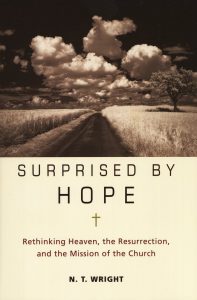 life. Over the years we have hosted Brian Walsh and N.T. Wright and Jamie Smith and Lisa Sharon Harper (who gets at this Kingdom vision by way of the Biblical teaching about cosmic “reconciliation”) to help folks see non-dualistic, creation-being-restored, this-worldly sort of whole-life discipleship and we have written often about attending conferences and organizing workshops and curating book lists about the renewal of our culture-shaping tasks.
life. Over the years we have hosted Brian Walsh and N.T. Wright and Jamie Smith and Lisa Sharon Harper (who gets at this Kingdom vision by way of the Biblical teaching about cosmic “reconciliation”) to help folks see non-dualistic, creation-being-restored, this-worldly sort of whole-life discipleship and we have written often about attending conferences and organizing workshops and curating book lists about the renewal of our culture-shaping tasks.
But, you know and I know that many ordinary folks in our churches or campus ministries or neighborhood Bible study groups or Sunday school classes aren’t going to wade through most N.T. Wright books or stunning books like Kingdom Callings or even the eloquent and thoughtful books by Mr. Garber.
So — voila —Robinson’s Reintegrate does the heavy lifting for you, bringing just the right amount of explanatory teaching, the right amount of “discovery” through conversation/reflection, and the right sort of side-bar quotes and citations from significant authors to make this a perfect introductory guidebook. It brings the content, but with a clear, light touch, with lots for anyone to find interesting. It will give you much to ponder if you read it yourself and much to talk about if you use it (as designed) in a small group.
It is arranged so helpfully by showing how our vocational and work lives can be shaped by the key aspects of the Biblical story, the realities we sometimes call in shorthand creation/fall/redemption/restoration. Each chapter explores how this part of the Biblical drama offers key insights, how each “chapter” of the story can frame our understanding of what is going on in our lives and world and work, and how they each anticipate the next chapter of the full gospel story, the promise of meaning and hope and final restoration. My, my, this is edge-of-your-seat stuff for those that are new to this framework and a wonderful refresher for those who think they get it.
Want to know what “thy Kingdom Come on Earth…” really means and what implications it has for your daily living, even at work? Reintegrate will help. I promise.
I like that the sidebar quotes that Bob comments upon or invites us to ponder are all rooted in this all-of-life-redeemed worldview. There’s much to consider from the beautiful writing of Cornelius Plantinga and Steve Garber to the ‘creation-restored’ vision of redemption found in the books of Al Wolters and Hugh Whelchel and Michael Witmer and Paul Marshall – do you know his handbook for thoughtful Kingdom living called Heaven Is Not My Home: Living in the Now of God’s Creation? (that Bob cites it just warms my heart! I love that book!)
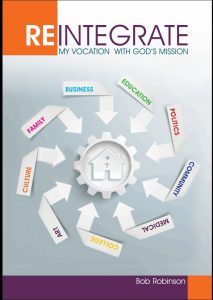 For those who need a short a punchy introduction to a culturally-engaged, integrated Kingdom way of seeing our redemptive calling in the world, with a guide to process and apply this wholisitic, missional shift in perspective, for those who know that learning happens best when it is done in community, well, there is simply nothing like this book in print today.
For those who need a short a punchy introduction to a culturally-engaged, integrated Kingdom way of seeing our redemptive calling in the world, with a guide to process and apply this wholisitic, missional shift in perspective, for those who know that learning happens best when it is done in community, well, there is simply nothing like this book in print today.
Allow me to say that again: there is nothing like Reintegrate Your Vocation with God’s Mission in print today.
I am not alone is saying this, by the way. Please read these few blurbs –there are more inside the book, indicating that many folks are hoping this books is bought and used. Kudos, Bob!
This is one of the finest study guides I know for people who are eager to align their personal vocation with God’s mission in the world. Dr. Mark Roberts, Executive Director of the Max DePree Center for Leadership
Utilizing a robust theology of vocation, a coherent biblical framework and a transforming pedagogy of interactive dialogue, Reintegrate has the potential to truly change your life. I highly recommend it. Tom Nelson, author Work Matters and President of Made to Flourish
Reintegrate is an evergreen explanation of truth told in four chapters: Creation, Fall, Redemption, Consummation. This overarching four-chapter story lays a foundation for providing the meaning and fulfillment we all seek in life. Highly recommended! Hugh Whelchel, author of How Then Should We Work? and Director of Institute on Faith, Work & Economics
This Bible study is creative and intriguing and will help Christians wee how all of life matters to God, especially in all of the hours we spend away from environments typically labeled “spiritual”.” Bob Robinson has done a great service to the church, helping us reintegrate our lives that are all too often insufficiently integrated with our faith. Vincent Bacote, Director, The Center for Applied Christian Ethics, Wheaton College
How do we make an utterly essential paradigm shift in not only our minds, but also in our hearts? How do we re-view what may be familiar passages of scripture with new eyes? In this thoughtful and practical study, Bob Robinson has provided us with fresh ways to engage Scripture, provocative case studies and helpful application to gain new perspective on whole-life discipleship. If workplaces are primary places of spiritual formation, then this guide must be part of your journey. Lisa Pratt Slayton, CEO Pittsburgh Leadership Foundation
We’d love for you to order a few of these small books from us and consider doing the study. We are very glad to stock it, praise God for Bob’s friendship and good work, and – okay, I can say it, now –it makes our own work-day brighter just telling you about these rare kinds of resources. Three cheers!
HERE ARE FOUR OTHER RECENT RESOURCES THAT WILL DEEPEN YOUR INSIGHT ABOUT THIS TOPIC — ALL ON SALE.
 Every Job a Parable: What Walmart Greeters, Nurses, and Astronauts Tell Us about God John Van Sloton (NavPress) $14.99 I reviewed this extensively in a previous BookNotes, so won’t say much more now except to remind you that it really is an fabulously upbeat and enjoyable read and brings something unique to this conversation about faith and work. Yes, our workplaces can be parables, revealing stuff about God and God’s world. As we attend to Christ’s presence in our jobs, and the good our jobs can offer to us and to the world, we just might be given very new eyes to see things anew. Wow, what a book!
Every Job a Parable: What Walmart Greeters, Nurses, and Astronauts Tell Us about God John Van Sloton (NavPress) $14.99 I reviewed this extensively in a previous BookNotes, so won’t say much more now except to remind you that it really is an fabulously upbeat and enjoyable read and brings something unique to this conversation about faith and work. Yes, our workplaces can be parables, revealing stuff about God and God’s world. As we attend to Christ’s presence in our jobs, and the good our jobs can offer to us and to the world, we just might be given very new eyes to see things anew. Wow, what a book!
Do come back and read the rest of my reviews here, but do visit our previous BookNotes newsletter where I featured this innovative book and where I said much about the value of it and the amazing sermons (about different jobs) that inspired it. There’s a link to a great trailer by John Van Sloton, too. His website is fantastic and you should be sure to tell folks about it. Great stuff!
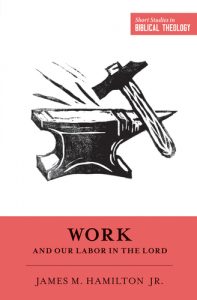 Work and Our Labor in the Lord James M. Hamilton Jr. (Crossway) $14.99 Above I’ve mentioned some bigger or seminal titles, hefty and vital. And there are shorts ones, brief and easy. This one is curious as it is mature and thoughtful and brief. It is part of a fabulous series called “Short Studies in Biblical Theology.” Well, let’s hope theology is Biblical, you might quip, but, you know, this phrase (“Biblical theology”) has a particular meaning – it is somewhat in contrast to “systematic theology” that arranges theological notions in categories created by theologians – the nature of sin, the role of the cross, what we think of the Trinity or the divinity of Jesus or the end times and such. Sure they use the Bible, but it systematizes these abstract topics. Biblical theology on the other hand, attempts to see how topics can be understood as guided by the narrative nature of the Bible itself. It attempts to honor the integrated teachings of law and prophets and gospels and epistles as they hold together in a plotline that finds their culmination in Christ.
Work and Our Labor in the Lord James M. Hamilton Jr. (Crossway) $14.99 Above I’ve mentioned some bigger or seminal titles, hefty and vital. And there are shorts ones, brief and easy. This one is curious as it is mature and thoughtful and brief. It is part of a fabulous series called “Short Studies in Biblical Theology.” Well, let’s hope theology is Biblical, you might quip, but, you know, this phrase (“Biblical theology”) has a particular meaning – it is somewhat in contrast to “systematic theology” that arranges theological notions in categories created by theologians – the nature of sin, the role of the cross, what we think of the Trinity or the divinity of Jesus or the end times and such. Sure they use the Bible, but it systematizes these abstract topics. Biblical theology on the other hand, attempts to see how topics can be understood as guided by the narrative nature of the Bible itself. It attempts to honor the integrated teachings of law and prophets and gospels and epistles as they hold together in a plotline that finds their culmination in Christ.
Anyway, as ponderous as some Biblical Theology is, this recent series is accessible and helpful in quickly surveying the Bible’s coherent framework as it shapes our views of varying topics. For instances, the first one was called The Son of God and the New Creation by Graeme Goldsworthy; the second was called Marriage and the Mystery of the Gospel by Ray Ortlund and the most recent is Covenant and God’s Purposes for the World by Tom Schreiner.
In any event, this new one, Work and Our Labor in the Lord is thoughtful and mature and Biblical and important.
Here are the four intense chapters, in just over 100 small-sized pages:
- Creation: Work in the Very Good Garden
- Work After the Fall: Fallen, Futile, Flourishing
- Redemption: Work Now That Christ Has Risen
- Restoration: Work in the New Heavens and the New Earth

DVD ReFrame: Connecting Faith and Life Regent College Marketplace Institute $99.00 Participants Guide, $12.00; Leaders Guide, $12.00
I hope you know of Regent, the innovative Christian graduate school in Vancouver, British Columbia. It has long been a blessing – just to know it exists makes me glad; it is not a seminary, as such, nor a Bible College. It draws on the deepest traditions within the broad Body of Christ (although it is historically evangelical, founded in the late 1960s to serve thoughtful laity by James Houston, a scholar and faithful Christian leader informed by the medieval spiritual classics and serious theology.) Authors we admire who have been on staff there over the years include J. I. Packer, Eugene Peterson, Marva Dawn, Luci Shaw, and the evangelical Earth-keeping scholar and eco-activist Loren Wilkinson.
One of the great pioneers of marketplace ministry is Dr. Paul Stevens who has proclaimed a wide-as-life, transforming vision for decades, and he has regularly taught work-world and business-related courses there. He has written numerous, excellent books on the faith/work movement and we stock them all. (See, just for instance, Doing God’s Business or Taking Your Soul to Work or Work Matters: Lessons from Scripture or The Other Six Days.) Stevens has retired, I’ve heard, and in his absence Regent has hired our good friend and wonderful author and speaker and educator Steve Garber. That Steve has been friends with Houston and Packer and Stevens and others in the Regent circles is no surprise; he counts as one of his dearest mentors and friends the late John Stott, who also had some Regent-esque qualities. His theories and practices explained in Garber’s book about life-long learning, The Fabric of Faithfulness, is surely in keeping with Regent’s hopes and visions for on-going education of Christian laypeople. Steve’s contributions to this already vibrant, international learning community will be marvelous and we wish him and his wife, Meg, all God’s blessings there.
Garber was involved a bit in dreaming up and being a midwife for the production of this exceptional video curriculum, so he is not new to Regent; indeed Reframe is published cooperatively in association with Garber’s Washington Institute on Faith, Vocation and Culture. We’ve mentioned it at BookNotes before but we’ve been wanting to describe it in great detail. Allow me to say that it is very, very well done, aesthetically and spiritually and theologically. The content is incredibly solid and mature, the presentation crisp and vivid and interesting. It could hardly be recommended more highly.
I will tell you a bit about it, but you really should visit the Reframe website to get a better glimpse. Visit them at https://www.reframecourse.com/
Yes, there is a lot of content. Even the website has plenty to look at. The DVD that we sell has 10 forty-minute sessions and the study guides offer plenty of assistance to help you discuss it all. It is a truly remarkable resource, years in the making.
Although it is aesthetically rich and very interesting at it’s core there are organizing lectures by solid professors in each of the 10 classes in this course.
You will be hosted by Mark Mayhew (one of the primary co-creators and former director of the Regent College Marketplace Institute) and Erin Antosh, who has worked with Garber at the Washington Institute of Faith, Vocation and Culture. You will get to sit under and listen to great teachers such as Paul Williams (who, before coming to Regent, served as Chief Economist and Head of International Research for an international real estate consulting and investment banking group based in London) and Sarah Williams (a professor of church history at Regent who previously taught at the University of Oxford.) Iain Provan is a beloved Biblical study prof at Regent (who is also ordained in the Church of Scotland.) Other respected profs from Regent share the teaching load for ReFrame – you will learn from Phil Long, the amazingly energetic Rikk Watts, Bruce Hindmarsh and Polly Long.
Further, there are thoughtful contributions by what they call “practitioners” — business people and teachers and artists and civic activist and scientists, men and women from around the world, each telling about their own role in bringing God’s restoration and shalom to bear in their respective arenas.
Interwoven throughout these 10 sessions are over 25 interviews with men and women (again, from all over the world) who are quite articulate about what they do and why, how they are able to think and live faithfully in their callings, inspired by this integral vision. There is a healthy diversity among these salt and light leaders and they bring a real lively tone to it all – take a look at the website and see the folks involved. You’ll be very impressed, I’m sure.
The Reframe: Connecting Faith and Life DVD course is a good investment for your group or church; if you are interested in this topic you really should own it. It is the crème de la crème of this marketplace movement.
I hope the many organizations and think-tanks and church-based ministries and Fellows programs helping people relate faith and work – I’m talking to you, Denver, Nashville, South Hamilton, Washington, Tempe, Baltimore, Wheaton, Charlotte, Charlottesville, Longview, St. Louis, Lancaster, Grand Rapids, Jackson, Ithaca, Orlando, New York, Chicago, Pittsburgh, Phoenix, Philly – consider ordering this from us.
Maybe it could be a hefty follow-up in your church or campus after a study of Bob Robinson’s book. Or after you’ve used For the Life of the World, that enthralling DVD which we continue to sell well.
This curriculum is wonderfully aided by the great Leader’s Guide which is carefully produced in full color printing. There is much substance just in the almost 100 page workbook and it is a must-have tool to lead groups through the DVD course.
For what it is worth, although this really is about faith and life, living well in the world (but not of it) and with special attention to our jobs and careers and callings, it is, largely, a Biblical studies course. Like the other books I’ve named above, they relate the grand meta-narrative of the Bible to our own times, showing how that story of creation and fall, of Israel and Jesus, of Church and Mission, of New Heavens and New Earth can become our story. In fact, the first two sessions of Reframe are under the heading of “The Story We Find Ourselves In” where cultural stories are shared to help viewers think about how we tend to frame our lives in our own various places these days. And how the gospel allows us to “reframe” the meaning and director of our lives.
The large middle part – sessions 3 to 7 – do the Biblical story, and they do it with depth and vision. There is always this sense that we now stand within this big unfolding work of God, as found in the story of creation and Israel, Jesus and Church. But it is basically a very robust bit of Bible teaching.
The third part – called “The Ongoing Story” has three classes for how we now live out this story of Scripture. The sessions are called “Strangers and Exiles” and “Ambassadors” and “Joyful Living.”

 There is in the Leader’s Guide a lovely bit of extra help for “Continuing the Journey” and even a set of prayers from throughout the ages that can be used in your Reframe group.
There is in the Leader’s Guide a lovely bit of extra help for “Continuing the Journey” and even a set of prayers from throughout the ages that can be used in your Reframe group.
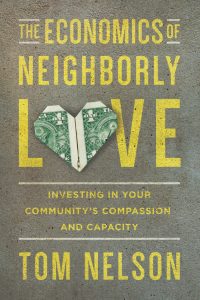 The Economics of Neighborly Love: Investing in Your Community’s Compassion and Capacity Tom Nelson (IVP) $16.00 I mentioned above that one of Bob Robinson’s good influences was Tom Nelson, whose wonderful book, Work Matters, documents how his church shifted from mostly churchy stuff to equipping the flock for real-world mission, speaking about vocation and calling and work. The attention Tom’s church and the workers in various careers in his church have gotten now has been a great encouragement to many of us who care about this perspective and movement, so it is good to know that Tom has created a network of pastors called Made To Flourish that helps churches focus on cultural engagement that creates human flourishing and benefits the common good. Out of his work with his own Christ Community Church in Leawood Kansas, and his MTF contacts, he has written what might be considered a sequel to Work Matters – and oh-my-goodness, is it great!
The Economics of Neighborly Love: Investing in Your Community’s Compassion and Capacity Tom Nelson (IVP) $16.00 I mentioned above that one of Bob Robinson’s good influences was Tom Nelson, whose wonderful book, Work Matters, documents how his church shifted from mostly churchy stuff to equipping the flock for real-world mission, speaking about vocation and calling and work. The attention Tom’s church and the workers in various careers in his church have gotten now has been a great encouragement to many of us who care about this perspective and movement, so it is good to know that Tom has created a network of pastors called Made To Flourish that helps churches focus on cultural engagement that creates human flourishing and benefits the common good. Out of his work with his own Christ Community Church in Leawood Kansas, and his MTF contacts, he has written what might be considered a sequel to Work Matters – and oh-my-goodness, is it great!
Please notice the subtitle… work really is for “the common good” and we should, as we can, think about ways to help our neighborhoods grow, our towns and cities flourish, the needy among us find meaningful work, and hope and work for healthy economies and community development. I wish space permitted a more full review, but for now allow me to name it here and assure you I’m eager to study it. (I wonder if he will talk about supporting local business, why publisher and parachurch organizations ought not link to amazon and why we should be thoughtful about supporting businesses that are principled and not merely the ones with biggest footprint. Hmm.) The Economics of Neighborly Love deserves a many-page review itself for its good insight and exceptionally practical proposals, but for now, just know we are very eager to sell some of these. It is going to make a difference for those who consider it and is surely one of the important, strategic books of the year.
In the opening pages, Tom tells us about growing up very poor. He talks about his call into ministry and what lead him to admit to what he called “clergy malpractice” in not honoring the jobs and work people do outside the walls of the church. It’s a great few pages and I love his humble and kind and pastoral tone about his own journey to care about work and a vision for God’s ordinary people in the world.
And then, he writes:
I am delighted that so many have recently written on the deep and significant connections between faith and work, making the case that our individual work truly matters to God and to our neighbors. Yet, while our personal vocations do, of course, matter a great deal, they are by no means the entire story. Our work always takes place within larger economic realities; we are part of a much bigger story. All of our collaborative, value-adding work takes place within a system of cooperative global exchange. This is what modern, everyday economics is all about. From my pastoral perspective, far too little has been written or taught to the rising generation of leaders about how theology and economics seamlessly intersect. The glaring irony is that Holy Scripture speaks a good deal about economic flourishing. Yet in our personal lives, in our congregations and in our work, we all too often woefully neglect to connect the gospel of the kingdom with economics. This harms our witness, our cities, and our future. The church needs to address and begin the hard work of overcoming the perilous Sunday-to-Monday gap.
I love his heart, his hope for his book, his clarity about The Economics of Neighborly Love: Investing in Your Community’s Compassion and Capacity:
From this crucible of my own pastoral malpractice, and in the gracious providence of God, I am hopeful that some of the insights I have assembled in the pages that follow will stretch your mind, inspire your heart, and spark your imagination in new ways. My prayer is that you might become more like Jesus, better loving your neighbor, and growing in fruitfulness to your vocational calling within the larger web of economic order that the God of history has marvelously invited us to inhabit.
So, there’s five great resources to consider as we move towards Labor Day and a new season of church and para-church programing. I hope your own congregation or faith community or campus ministry organization helps people think about the big story of which we are apart, and that you use something like Bob Robinson’s fabulous little resource Reintegrate Your Life With God’s Mission. It will be an asset to your hopes of nurturing a deeper and more relevant and lively sort of discipleship. And then dig deeper, thinking about work and “framing” our vocations and even our economic life. These books are too good to ignore. Buy ’em, use ’em, and — as Garber puts it in the sub-title of his lovely, thoughtful Visions of Vocation — keeping seeking “common grace for the common good.” We stand ready to serve you further. Happy Labor Day.
BookNotes

SPECIAL
DISCOUNT
ANY ITEM MENTIONED
20% Off
order here
takes you to the secure Hearts & Minds order form page
just tell us what you want
inquire here
if you have questions or need more information
just ask us what you want to know
Hearts & Minds 234 East Main Street Dallastown, PA 17313
read@heartsandmindsbooks.com
717-246-3333
